- Home/
- Our Work/
- Health Emergencies/
- HEDRM research network

Health EDRM research network
Meeting reports
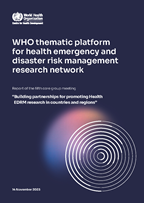
The 5th Core Group meeting
Twenty-five World Health Organization (WHO) and Health EDRM experts participated in the meeting. They identified a strong need for strengthened partnerships...
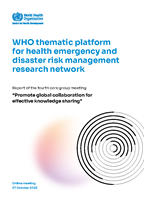
The 4th Core Group meeting
The meeting objective was to produce agreed actions for the Health EDRM RN for 2023–2024, focusing on the four key milestones for successful...
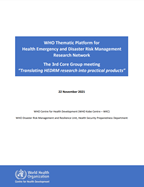
The 3rd Core Group meeting
The WHO Centre for Health Development (WHO Kobe Centre: WKC) convened the third Core Group meeting of the WHO Thematic Platform for Health Emergency...
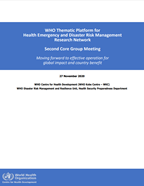
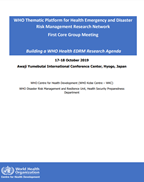
The 1st Core Group Meeting
The WHO Centre for Health Development (WHO Kobe Centre: WKC) convened the first core group meeting of the WHO Thematic Platform for Health Emergency and...
Identifying key research themes is vital to address the urgent need for Health EDRM research to develop evidence-based policies, programmes and practices for effective all-hazards health emergency prevention, preparedness, response and recovery. Four research themes were identified at an expert meeting in 2018. WKC called for proposals and initiated four research projects in 2019. The 2nd core group meeting in 2020 further identified more emerging research needs and two more projects commenced in 2021.
The WHO Guidance on Research Methods for Health Emergency and Disaster Risk Management was developed in 2021 in order to facilitate more research that cam provide high-quality evidence for well-informed decision making for Health EDRM. The WHO Global Dissemination Initiative aims to promote the Guidance at various presentations and to encourage active implementation in teaching and training activities across the globe with the support of key participants in the Health EDRM Research Network.
Registration
With the WHO Kobe Centre's activities drawing to a close, we will temporarily suspend the recruitment of new Health EDRM RN members. Recruitment will resume once the activities have been transferred to the WHO Headquarters. In the meantime, currently registered members will receive email updates separately regarding future activities. Please send any queries to: kayanor@who.int (Ryoma Kayano, Technical Officer). Thank you for your support.
Related web articles
Related documents (PDF)
WHO Thematic Platform for Health EDRM Research Network Terms of reference (As of April 2024) WHO Thematic Platform for Health EDRM Research Network Terms of reference (As of April 2024)
WHO Thematic Platform for Health EDRM Research Network Project brief 2018 WHO Thematic Platform for Health EDRM Research Network Project brief 2018
WHO Thematic Platform for Health Emergency and Disaster Risk Management Terms of Reference 2018 WHO Thematic Platform for Health Emergency and Disaster Risk Management Terms of Reference 2018
Publications
- Kayano R, Nomura S, Abrahams J, Huda Q, Chan EYY, Murray V. Progress towards the Development of Research Agenda and the Launch of Knowledge Hub: The WHO Thematic Platform for Health Emergency and Disaster Risk Management Research Network (Health EDRM RN). International Journal of Environmental Research and Public Health. 2021; 18(9):4959. https://doi.org/10.3390/ijerph18094959.
- Nomura S, Kayano R, Egawa S, Harada N, Koido Y. Expected Scopes of Health Emergency and Disaster Risk Management (Health EDRM): Report on the Expert Workshop at the Annual Conference for the Japanese Association for Disaster Medicine 2020. International Journal of Environmental Research and Public Health. 2021; 18(9):4447. https://doi.org/10.3390/ijerph18094447.
- Kayano R, Chan EY, Murray V, Abrahams J, Barber SL. WHO Thematic Platform for Health Emergency and Disaster Risk Management Research Network (TPRN): Report of the Kobe Expert Meeting. Int J Environ Res Public Health. 2019; 16(7):E1232. doi: 10.3390/ijerph16071232.
- Kubo T, Tanasan A, Herbosa T, Buddh N, Fernando F, Kayano R. Health Data Collection Before, During and After Emergencies and Disasters-The Result of the Kobe Expert Meeting. Int J Environ Res Public Health. 2019; 16(5):E893. doi: 10.3390/ijerph16050893.
- Aung MN, Murray V, Kayano R. Research Methods and Ethics in Health Emergency and Disaster Risk Management: The Result of the Kobe Expert Meeting. Int J Environ Res Public Health. 2019;16(5):E770. doi: 10.3390/ijerph16050770.
- Généreux M, Schulter PJ, Takahashi S, Usami S, Mashino S, Kayano R, Kim Y. Psychosocial Management Before, During, and After Emergencies and Disasters-Results from the Kobe Expert Meeting. Int J Environ Res Public Health. 2019;16(8):E1309. doi: 10.3390/ijerph16081309.
- Chan EYY, Murray V. What are the health research needs for the Sendai Framework. Lancet. 2017;390:e35–e36. doi: 10.1016/S0140-6736(17)31670-7.
- Lo STT, Chan EYY, Chan GKW, Murray V, Abrahams J, Ardalan A, Kayano R, Yau JCW. Health Emergency and Disaster Risk Management (Health-EDRM): Developing the Research Field within the Sendai Framework Paradigm. Int. J. Disaster Risk Sci. 2017;8:145–149. doi: 10.1007/s13753-017-0122-0.
Related Links
Global hazards weekly bulletin (by UK Health Security Agency - UKHSA)
UNDRR/ISC Hazard definition and classification review (2020)
